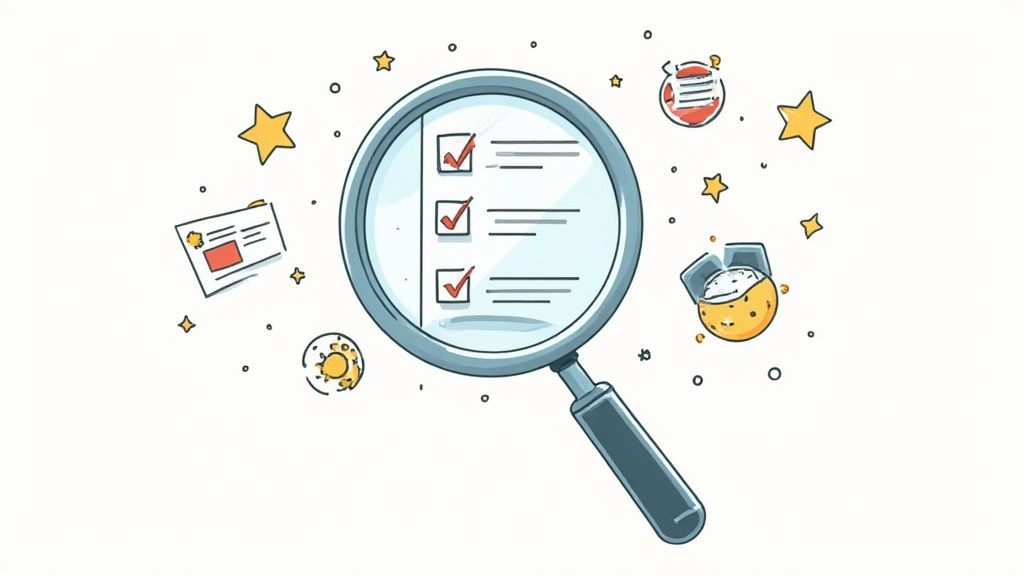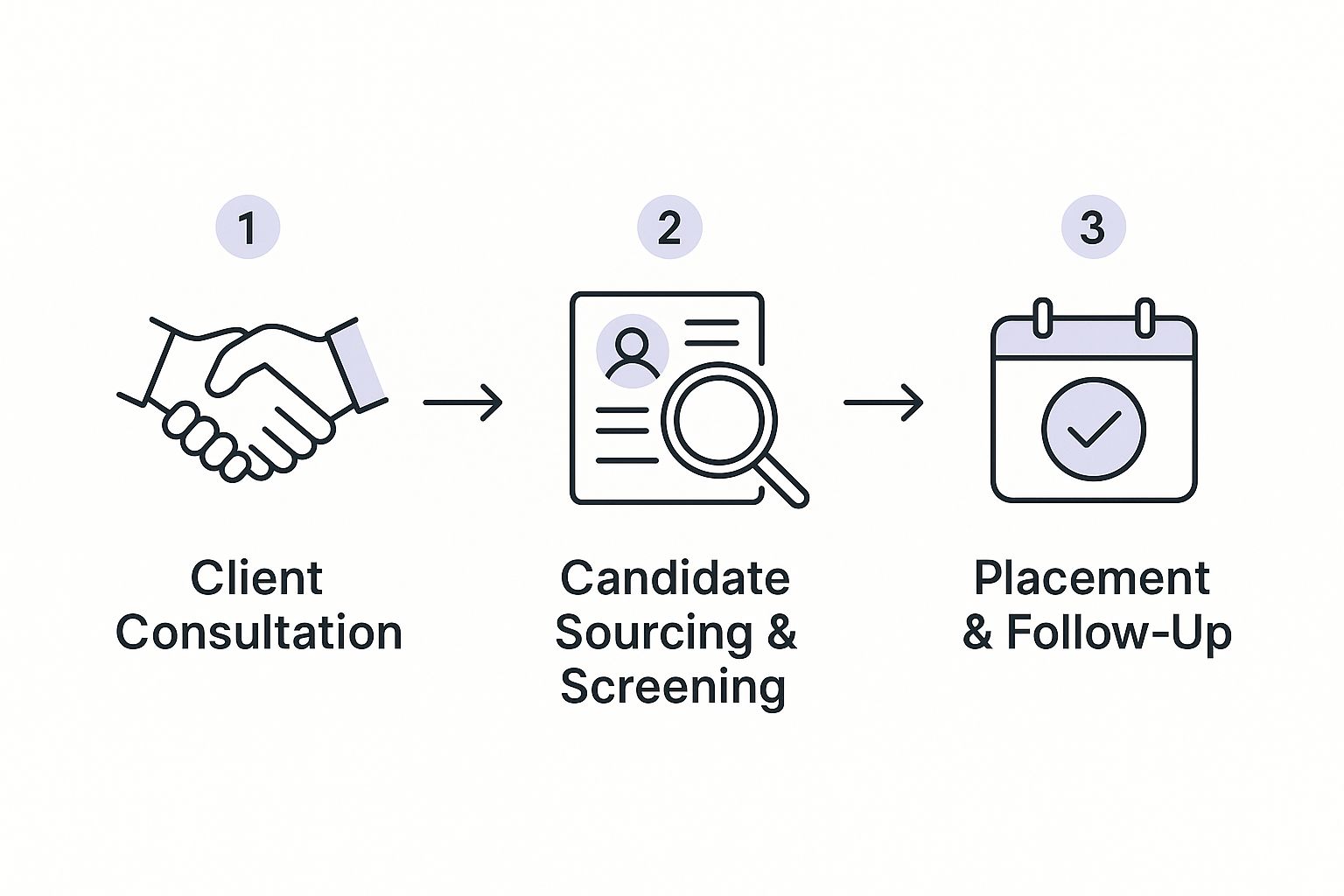
Let’s be honest, your ‘We’re Hiring!’ LinkedIn post just isn’t cutting it. Hiring senior software engineers has become a full-contact sport, and right now, you’re getting outplayed. You don’t just need a coder; you need someone who won’t break your culture, your codebase, or your bank account.
Turns out there’s more than one way to hire elite developers without mortgaging your office ping-pong table. But first, let’s talk about why your current approach is probably on fire.
You’ve got a killer product, a brilliant roadmap, and a team that’s fired up and ready to build. The only problem? That empty chair in the engineering department is starting to gather dust. You’ve posted the job everywhere, maybe even dangled a referral bonus, but your pipeline is either bone dry or filled with candidates who… well, let’s just say they don’t inspire much confidence.
Sound familiar? You have to admit the old way is failing you.
If you’re a founder or a hiring manager, every minute you spend sifting through mismatched résumés is a minute you’re not spending on your actual job. The cycle is as brutal as it is predictable:
This isn’t just inefficient; it’s a massive drain on your most valuable resource: your team’s focus. A top engineer’s time is worth hundreds of dollars an hour, yet you’re burning it on admin tasks a specialized partner could handle in their sleep.
Here’s the hard truth: the best engineers aren’t unemployed. They are passive candidates, happily employed but open to a truly compelling opportunity. Your standard job post will never reach them. And even if it does, a slow, clunky interview process will send them running straight to your competitors.
A study found that the best candidates are off the market in just 10 days. If your hiring process drags on for weeks, you are systematically filtering out the most sought-after talent.
Top-tier talent expects a professional, streamlined, and respectful process. When they get ghosted after an interview or get stuck in a six-stage interview loop from hell, they don’t just reject your offer—they tell their network you’re a mess. That’s a reputation hit you simply can’t afford.
Working with the right software engineering recruitment agencies isn’t just about finding people; it’s about fixing the broken system that’s costing you talent in the first place.
Every agency website promises to find your next unicorn, complete with a stock photo of smiling professionals in a glass-walled office. But what are you actually paying for? Let’s pop the hood and see what the engine looks like.

It’s about more than just forwarding résumés they scraped from LinkedIn. A true partner among software engineering recruitment agencies should be an extension of your own team—one that handles the grunt work so you can get back to building your business.
An agency’s first job is to build a pipeline. This isn’t about posting on a job board and praying. They actively hunt, tapping into hidden networks of passive candidates who aren’t looking for a job but are open to hearing about the right one.
This isn’t just about matching keywords, either. A great agency’s screening process is a multi-stage gauntlet designed to filter out the noise. They should be conducting initial technical screens, culture fit interviews, and verifying the claims that look a little too good to be true.
Many small businesses struggle with these fundamental HR tasks. A comprehensive guide to HR for small businesses can shed light on these common challenges and show exactly where a good agency is supposed to step in.
This entire process is powered by increasingly sophisticated tools. The global recruitment software market was valued at USD 1.75 billion back in 2017 and is projected to hit USD 3.1 billion by 2025. This growth is all driven by the need to manage high applicant volumes and complex hiring requirements.
You’ll hear two terms thrown around constantly: contingent and retained. Understanding the difference is absolutely critical.
A contingent recruiter is a vendor; a retained recruiter should be a partner. If you’re serious about finding top-tier talent, you need a partner. You can learn more about this strategic approach in our founder’s guide to recruiting for engineers.
The real value isn’t in the list of names they send you. It’s in the list of names they don’t send you—the hundreds they’ve already vetted and disqualified to save you time.
So, how does the classic agency model stack up against a more modern, partnership-focused approach? The difference is stark. Traditional agencies often work on a transactional basis, but modern partners are invested in your long-term success.
| Feature | Traditional Agency | Modern Partner (like LatHire) |
|---|---|---|
| Sourcing | Public job boards, keyword searches | Deep network, passive candidate outreach |
| Screening | Basic résumé review, HR screen | Multi-stage technical and cultural vetting |
| Model | Transactional, focused on placement fee | Partnership, focused on long-term fit |
| Expertise | Generalist recruiters | Specialized, often founder-led insight |
| Value | Fills a seat | Fixes your hiring process |
Choosing the right type of agency is the first step in transforming your hiring from a liability into a competitive advantage. It’s the difference between just filling a role and strategically building your dream team.
Picking the wrong software engineering recruitment agency isn’t just a misstep; it’s a hand grenade rolled straight into your product roadmap. The real cost isn’t the fee—it’s the chaos that comes after.

You sign a contract thinking you’ve offloaded your biggest headache. In reality, you’ve just swapped one problem for a dozen smaller, more infuriating ones. Suddenly, your inbox is flooded with résumés that look like they were pulled from a completely different job search. Did anyone on their team even read your job description?
Let’s talk money. The most obvious red flag is an outrageous fee structure. Many traditional agencies still charge 25-30% of a candidate’s first-year salary. For a senior engineer, you could be looking at a bill of $40,000 or more—just for an introduction.
That’s a steep price for what often amounts to a glorified résumé-flipper. If all they’re doing is basic keyword matching on LinkedIn, you’ve essentially paid them the price of a new car to do something your team could have done over a weekend. It’s the first and most painful hidden cost.
The financial hit is bad, but the operational damage is far worse. A bad hire, brought to you by a careless agency, costs so much more than their salary and the recruitment fee combined.
Just think about the fallout:
These are the costs that never show up on an invoice. You’re not just back to square one; you’re several steps behind, with a demoralized team and a much lighter bank account. Spotting these pitfalls early is critical. You can learn more about what to look out for by reading up on the common mistakes to avoid when hiring remote talent.
The wrong agency treats hiring like a simple transaction. A great agency understands it’s a strategic investment in your company’s future. That difference is everything.
Before you sign on the dotted line, you have to scrutinize the agreement. For businesses without a dedicated legal department, deciphering the fine print feels impossible. Getting familiar with tips on contract review for non-lawyers can help you spot red flags and protect your interests. A true partner offers a clear agreement; a bad one buries you in jargon.
Let’s be brutally honest. Your internal hiring process is probably part of the problem. That vague job description, the six-stage interview gauntlet, the week-long radio silence between rounds? Those aren’t just quirks; they’re costing you top talent.
A top-tier agency doesn’t just find people; they act as a consultant to fix your broken process. They’re the friend who tells you there’s spinach in your teeth before you walk into a big meeting. You need that kind of direct, pragmatic feedback.
The market for software engineers is fierce. With software development roles projected to grow by 17% and add nearly 327,900 jobs between 2023 and 2033, companies are becoming incredibly selective. A great agency provides the market intelligence you need to stand out.
This means they’ll help you answer critical questions like:
This isn’t just about filling a role; it’s about positioning your company as a place where elite talent wants to work. They turn your vague wish list into a compelling job spec that attracts the right kind of attention.
A slow hiring process is a candidate repellent. The best engineers have options, and they won’t wait around for three weeks while your team debates culture fit. A good agency forces you to get your act together.
They act as an objective third party, streamlining your interview stages and enforcing feedback loops to keep candidates engaged and informed.
A great agency’s job isn’t just to find you candidates. It’s to make sure you don’t lose the great ones you already have. They install the guardrails that prevent top talent from slipping through your fingers.
They’ll work with you to define a clear, concise interview plan—one that respects everyone’s time and effectively assesses the skills that matter. No more “let’s just add one more call” shenanigans. This isn’t just about speed; it’s about showing candidates you are a professional, decisive organization.
That signal alone can be the difference between a signed offer and a ghosted email chain.
Okay, time for a little self-aware horn-tooting. We didn’t start LatHire because the world needed another recruiting agency. We started it because we were tired of the traditional model—we’ve been in the trenches as founders, and we know the pain of shelling out a massive fee only to get a pile of mismatched resumes.
This isn’t just a sales pitch. It’s our philosophy. We believe that software engineering recruitment agencies should be strategic partners, not just resume-flippers. The old way is broken, and we decided to build the solution we always wished we had.
Let’s be honest: the core problem with most agencies is that their “vetting” is a joke. It’s often just a keyword search, followed by a quick HR screen that confirms the person can form complete sentences. That’s a ridiculously low bar.
We do things differently. Our multi-stage process is designed to find engineers who can actually solve problems, not just talk about them. We dig deep into:
This rigorous process is how we ensure you only meet candidates who are genuinely worth your time. A good agency can seriously cut down the time it takes to find niche talent. It’s also worth exploring expert tips for hiring remote software developers, which is a critical skill for any growing tech company today.
Our process is structured to eliminate guesswork.

This structured, multi-stage process is what separates a true talent partner from a simple resume service. To give you a clearer picture, here’s a quick breakdown of how we evaluate every single candidate who enters our network.
| Stage | Description | Purpose |
|---|---|---|
| 1. Profile Review | Initial screening of resumes, portfolios, and professional history for relevant experience and skills. | To quickly filter for candidates who meet the baseline technical and experience requirements. |
| 2. Technical Assessment | A combination of live coding challenges and take-home assignments tailored to specific tech stacks. | To validate hands-on coding ability and practical application of knowledge, not just theoretical understanding. |
| 3. System Design Interview | A deep dive into architectural thinking, scalability, and problem-solving on a macro level. | To assess a candidate’s ability to design robust, scalable systems that align with business needs. |
| 4. Cultural & Soft Skills Fit | A behavioral interview focusing on communication, collaboration, and remote work readiness. | To ensure the candidate can integrate seamlessly into a remote team and contribute positively to the company culture. |
| 5. Final Approval | A comprehensive review by our senior team to confirm the candidate meets our standards for the LatHire network. | To provide a final quality check and greenlight the candidate for introduction to our partners. |
This isn’t just about ticking boxes; it’s about building a curated network of professionals we can stand behind.
We’re not interested in the quick placement fee. That transactional model is what creates bad incentives, pushing agencies to throw candidates at you hoping one sticks. Our entire model is built around forming genuine, long-term partnerships.
We focus on Latin America for a reason—it’s a goldmine of top-tier, senior engineering talent in a compatible time zone. This gives our partners a strategic advantage without the sky-high costs of the US market.
The recruitment software market is projected to hit USD 6.20 billion by 2032 as companies scramble to keep up. This explosion is forcing agencies to adopt better technology and processes to stay relevant, something we’ve embraced from day one.
We’re not saying we’re perfect. Just more accurate more often. Our goal is to connect you with talent that will stay and grow with you, not just fill a seat for six months.
By combining deep technical vetting with a founder-led perspective, we solve the exact problems we’ve spent years complaining about. It’s about building a better system, and our guide on talent acquisition best practices that actually work dives deeper into this philosophy. We’re here to be the partner you can actually count on.
Alright, let’s get right to it. You’ve heard the pitch, but a few questions are probably still bouncing around in your head. We get it—we’ve been there too.
Here are the straight-up answers to the questions we hear most often from founders trying to figure out if software engineering recruitment agencies are the right move.

Forget the “hire in 48 hours” hype. That might work for entry-level roles, but it’s not how you find the senior engineer who will build your core product. For a genuinely vetted, high-caliber senior engineer, you should plan for 3-6 weeks from the initial brief to a signed offer.
That time isn’t dead air. It’s filled with deep sourcing, multi-stage vetting, and coordinating interviews around your team’s busy schedule. If someone promises it faster, a corner was cut somewhere.
The goal isn’t just to hire fast; it’s to hire the right person. A few extra weeks of diligence now can save you six months of technical debt and headaches later.
This is the big one, isn’t it? The industry standard for a contingent recruitment fee usually falls between 20% to 30% of the candidate’s first-year salary. So, for a senior developer making $150,000, you’re looking at a bill between $30,000 and $45,000. It’s a serious investment.
That’s precisely why you need to be crystal clear on what you’re getting. Is that fee buying you a dedicated partner who understands your vision, or just an expensive introduction? Some modern agencies are thankfully breaking this old mold with more sensible models, like smaller placement fees or even subscriptions that are far more startup-friendly.
You’ll hear these terms thrown around a lot, so let’s make it simple.
A contingent recruiter is a vendor. A retained recruiter is a partner. Choose accordingly.
Simple: it’s a massive strategic advantage. The talent pool in Latin America is exploding with highly skilled, senior software engineers who work in time zones that perfectly overlap with the US. You get world-class technical chops and strong English skills without the hyper-inflated salary demands of Silicon Valley.
This isn’t about finding “cheap” labor. It’s about accessing an incredible, often overlooked market of top-tier professionals. For any company looking to scale intelligently, this is the ultimate hiring hack—build a world-class team at a sustainable cost, without ever compromising on quality or communication.
